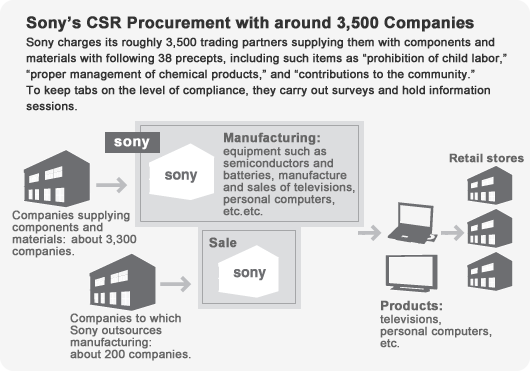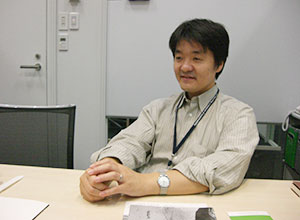No.23 1 Apr. 2009
What’s your level of awareness? Behind the products we buy.

INDEX
- P1What’s your level of awareness? Behind the products we buy.
- P2What familiar companies are doing Sony
- P3What familiar companies are doing Ministop
- P4Social responsibility as consumers.
What’s your level of awareness? Behind the products we buy.
Electronics and convenience stores too?
-What familiar companies are doing-
Products obtained via CSR procurement and fair trade products are still not the norm. However, there are examples of such goods that are quite familiar. We asked those in charge of CSR activities at electronics maker Sony and convenience store chain Ministop to tell about examples of what is being done in the manufacturing and retailing sectors, respectively.
Towards a production process anybody could take pride in.
Mr. Tomita Hidemi General manager of Sony corporation’s corporate social responsibility department.
More recently, we have been active in efforts with the aim of achieving a sustainable society, beginning activities related to the environment in 1990 and establishing the CSR Department in 2003. At the same time the CSR Department had been created, we initiated CSR procurement, one of the first among Japanese companies. The company believes that using its influence as a large corporation, it can help transform the other companies in its conglomerate as well as small- to mid-size trading partners, wielding a significant positive effect on society as a whole.

Behind the decision to commence CSR procurement.
There were two main occurrences leading to our decision to begin CSR procurement. First was the 1990s boycott movement led by NGOs and consumer groups after issues of child labor were discovered at the factories of a major apparel manufacturer’s subcontractor. Companies in the electronics industry like Sony saw that soon enough we too would be held accountable for conditions in our subcontractors’ factories. The other occurrence was a growing tide within the electronics industry to cooperate and actively promote CSR activities. Many of our trading partners and subcontractors also did business with other major IT manufacturers, and the various CSR activity standards set by companies were causing confusion and difficulty.
To alleviate such problems, Sony and other electronics makers formed the Electronic Industry Citizenship Coalition (EICC). In such a fashion, the various major corporations in the electronics industry came to hold consultations amongst ourselves to determine common standards for CSR involvement, while also having periodic exchanges of opinions with international NGOs and other groups.
Corporations can’t go it alone.
However, as long as there were people who had no choice but to work under even harsh labor conditions, it was possible that going ahead with CSR procurement would backfire, costing those same people their jobs. At the same time, companies cannot realistically provide welfare assistance as part and parcel of their principal business activities. Only through the aggregate effect of efforts by the government of the country along with supportive NGO activities will develop economy and mature society, giving corporate CSR activities a chance to work.
However, CSR procurement is not widely understood in Japan. Nor, even, is the term yet a ‘household’ name within the company. As such, we are currently holding monthly showings of movies dealing with the problems in the production process, as well as hosting talks by NGOs. One employee praised such efforts, saying, “I felt a renewed sense of pride in my work after learning how much they take into consideration in the manufacturing process.” First, after creating such awareness among the entire company’s employees, then eventually a similar awareness can be brought to the Japanese consumer, instilling a feeling of pride among producers and retailers as well as customers.

Profile of Mr. Tomita Hidemi
Started at the Sony Corporation in 1988. Assigned to the Central Research Laboratory. After having launched a research institute in Germany devoted to the development of environmental technologies and research, in 2000 he was assigned to the head office’s environmental management department (currently, the CSR Department). Presently, he supervises all CSR procurement activities.
